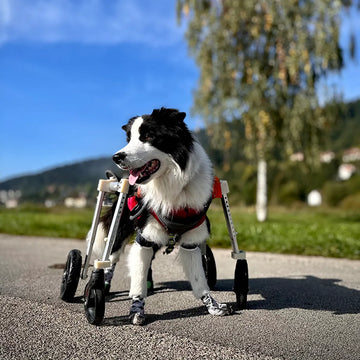Have you ever noticed your dog’s teeth chattering and wondered why? While it might seem odd or even amusing, teeth chattering in dogs can indicate a variety of underlying causes. Some are completely harmless, while others may signal a health issue that requires attention. In this guide, we'll explore the reasons behind this behavior and help you determine whether your furry friend needs a vet visit.

I. Common Reasons for Teeth Chattering in Dogs
1. Cold Weather and Shivering
Just like humans, dogs may chatter their teeth when they’re cold. If your pup is outside in chilly weather or in an air-conditioned room, this could be a natural response to maintain body heat.
2. Excitement and Anticipation
Dogs often express excitement in different ways, and teeth chattering in dogs is sometimes a sign of happiness. You may notice this behavior when your pup sees their favorite toy, meets another dog, or anticipates a tasty treat.
3. Stress, Anxiety, or Fear
Some dogs chatter their teeth when they’re nervous or anxious. If you notice your dog doing this in stressful situations—like during thunderstorms, fireworks, or vet visits—it could be a sign of anxiety-related teeth chattering.
4. Dental Problems and Oral Pain
One of the most common medical causes of dog teeth chattering is dental disease. Issues such as gingivitis, tooth decay, broken teeth, or oral infections can lead to discomfort, causing your dog’s teeth to chatter involuntarily. Regular vet check-ups and good oral hygiene can help prevent this.

5. Neurological Conditions
In some cases, teeth chattering in dogs may be linked to neurological disorders. Conditions such as focal seizures or tremors can cause involuntary muscle movements, including chattering teeth. If your dog is experiencing additional symptoms like twitching, uncoordinated movements, or unusual behavior, consult a veterinarian immediately.
6. Pain or Discomfort Elsewhere in the Body
Pain in other areas—such as the jaw, ears, or head—can also trigger dog teeth chattering. Ear infections, for example, may cause pain that leads to chattering as a response to discomfort.
II. How to Prevent Teeth Chattering in Dogs
Teeth chattering in dogs can be a sign of various underlying issues, ranging from dental problems to emotional stress or even environmental factors. To ensure your dog remains healthy and comfortable, here are some detailed steps you can take to prevent teeth chattering:
1. Maintain Good Oral Hygiene:
-Brush Your Dog’s Teeth Regularly: Use a dog-specific toothbrush and toothpaste to brush your dog’s teeth at least 2-3 times a week. This helps remove plaque and prevent dental issues like gum disease or tooth decay, which can cause discomfort and lead to teeth chattering.
-Provide Dental Chews and Toys: Dental chews and toys designed to promote oral health can help reduce tartar buildup and keep your dog’s teeth strong. Look for products approved by veterinary dental associations.
-Consider Professional Cleanings: Schedule professional dental cleanings with your vet as needed to address any hard-to-remove plaque or tartar.

2. Keep Your Dog Warm:
-Dress Your Dog Appropriately: If your dog is sensitive to cold weather, invest in a well-fitted dog sweater or jacket, especially during winter months or in chilly environments.
-Provide Warm Bedding: Ensure your dog has a warm, cozy bed with blankets or a heated pet pad to snuggle into. This is particularly important for small or short-haired breeds that are more susceptible to the cold.
-Limit Outdoor Exposure: During extremely cold weather, reduce the time your dog spends outside and ensure they have a warm shelter if they must be outdoors.
3. Reduce Anxiety and Stress:
-Identify Stress Triggers: Observe your dog’s behavior to determine what might be causing anxiety, such as loud noises, unfamiliar environments, or separation.
-Use Calming Tools: Anxiety wraps, like Thundershirts, can provide gentle pressure that helps soothe nervous dogs. Calming supplements or pheromone diffusers (e.g., Adaptil) may also help reduce stress.
-Create a Safe Space: Designate a quiet, comfortable area in your home where your dog can retreat when feeling overwhelmed.
-Training and Desensitization: Work with a professional trainer to desensitize your dog to stress triggers through positive reinforcement and gradual exposure.

4. Schedule Regular Vet Check-Ups:
-Routine Dental Exams: Regular vet visits allow for early detection of dental issues like cracked teeth, gum disease, or infections that could cause teeth chattering.
-Monitor Overall Health: Teeth chattering can sometimes be a symptom of underlying health problems, such as neurological issues, pain, or metabolic disorders. Your vet can perform a thorough examination to rule out these conditions.
-Follow Vet Recommendations: If your vet identifies a specific issue, follow their treatment plan, which may include medications, dietary changes, or further diagnostic tests.
5. Additional Tips:
-Monitor Diet: Ensure your dog is eating a balanced diet that supports overall health, including strong teeth and bones. Avoid feeding them overly hard or sticky treats that could damage their teeth.
-Stay Observant: Pay attention to any changes in your dog’s behavior or health. If teeth chattering persists or is accompanied by other symptoms like drooling, lethargy, or loss of appetite, seek veterinary advice immediately.
III: FAQ
Q1: Can certain dog breeds be more prone to teeth chattering?
Yes, some small breeds, such as Chihuahuas, are more likely to chatter their teeth due to their higher sensitivity to cold and excitement.
Q2: Can diet affect my dog’s tendency to chatter its teeth?
Yes, poor nutrition can contribute to dental problems, which may lead to chattering. Providing a balanced diet and appropriate dental chews can help maintain oral health.
Q3: How can I tell if my dog’s teeth chattering is due to dental pain?
Signs of dental issues include bad breath, difficulty eating, excessive drooling, or pawing at the mouth. A vet check-up is recommended to rule out dental disease.
Teeth chattering in dogs can have many causes, from excitement and cold weather to dental pain and neurological conditions. While it’s often harmless, it’s important to monitor your dog for any accompanying symptoms. When in doubt, a vet check-up can provide peace of mind and keep your pup happy and healthy!
The information provided above is for reference purposes only and should not replace professional veterinary advice.






